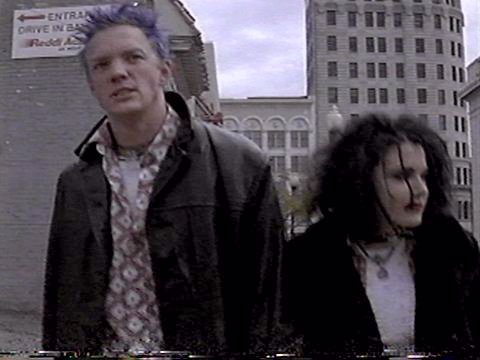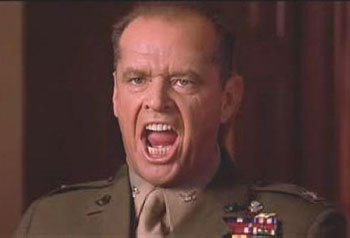Let’s move past the obvious choices for this category (Marc Antony’s funeral address in Julius Ceasar, William Wallace extolling his troops in Braveheart, Maximus’ reveal in Gladiator, etc…), and take a look at some of the unsung monologues in film. These are five that I absolutely love and personally, I don’t think they get the props they deserve. As always, there are SPOILERS and of course, your thoughts are appreciated.
S.L.C. Punk: Steve-O’s rant to his parents.
Perhaps not this author’s favorite cup of tea, especially prior to broadening my horizons in the world of film, I’ve never been partial to the punk trend and tend to think anyone who follows it to the extremes of detriment to their health and safety is an idiot; it’s a safe bet that I had no interest in seeing this film upon its release. In retrospect however, I’m so glad that I did. Matthew Lillard displays acting chops that few knew he had in this film, and brings a humble likeability to a character that so easily could have been nothing more than a bullying, leather-studded Ferris Bueller knock-off.
And it’s this scene when he really struts his stuff, presenting us his argument to the modern day notions about maturity, success, and following your destiny. While his parents are urging him to grow up and act more like them, he blatantly takes apart their cultural values and career plans in rapid fire succession, and then lays it out with the killer finish, “Don’t get me wrong Mom and Dad, I love you. But I’m 18 and for the first time in my life I can say this, F**K YOOOOU!!!!!”
A Few Good Men: Col. Jessep’s justification for his actions.
It would only stand to serve that this list include one monologue written by Aaron Sorkin, the dialogue master of the Brandon Universe (yeah, I’m trying it out). This film will be forever remembered for the tagline that got this speech going (“You can’t handle the truth!”) but that is just the beginning to one of Nicholson’s finest performances. Lt. Kaffee has pushed Col. Jessep to the point of rage on the witness stand, just as he planned to do, and he gives Jessep all the rope he needs to hang himself.
But in what could have been a simple moment where the good guys’ legal maneuvering works, Nicholson takes the brilliance of Sorkin’s dialogue and ratchets it up a few notches. By seething with anger at the impudent little punks that should rightfully show him gratitude for the job that he performs, Jessep lays out the logic that got the victim killed in the first place. The scary part, half way through the rant you begin to nod your head and start to agree with him, wondering who the hell Kaffee is to ask the man his business. Crackling with energy and the acting that has given Nicholson his numerous Academy Awards, this monologue represents him at his best.
25th Hour: Monty Brogan’s speech to the bathroom mirror:
Spike Lee’s love letter to post 9-11 New York City is a wonderfully brooding character study about one man’s desperate night before his seven year incarceration begins in the morning. Weaving Edward Norton’s (who’s never been better) Monty Brogan through a night out with friends, an investigation into who sold him out to the authorities, and the very un-Spike Lee ambiguous ending of whether or not his dad helped him escape the prison sentence, we are given a true sense of Brogan’s desperation to avoid what he knows is his fate.
But right in the middle of it all, there’s this little scene that showcases his disgust with it all. Brogan heads to the restroom, and spots some profanity on the wall, and (taking full use of Norton’s range as an actor) he lashes out against every single New York conventional stereotype he can think of in one blistering monologue. Cursing everyone from the criminals on the streets to the politicians in office; the religious figures around the city to the wanna-be gangsters hanging out in Bensonhurst, he curses them all. And finally, showing his true opinion of himself, he looks deep into the mirror and once and for all curses himself.
First Blood: John Rambo’s lament to Col. Troutman in the Police Station:
To most people today Sylvester Stallone is an aging action star that is beginning to stay at the party a little bit longer than he should. Sure, Rocky Balboa was great, and it took us all back to that time when Rocky was still a character that was in good movies, but he vastly over-shot on Rambo, and is threatening even the most forgiving of fan’s allegiance with the “The Expendables.” But before he was all these things, he was actually an actor. In fact, he was a good one, willing to take on darker roles and try and do real acting instead of just letting his biceps carry the show.
Case in point, this gut wrenching scene at the finale of what would become the birth of an American Icon. As he was written, John Rambo was a rather unsympathetic character who eventually crosses the line from war victim over to psychotic urban terrorist, and in the book the film was based upon, he sees his inability to fit in this world and takes his own life to escape it. But in the film version (for a variety of reasons), Col. Troutman, his only ally arrives to talk him down and is successful in breaking through the training-brainwashed soldier and is allowed a glimpse of the horror of this man’s experience. Several great lines hit below the belt (It was your war! You asked me, I didn’t ask you!) but its the emotional heap this unfeeling superman becomes that is what grabs you so tightly, and refuses to let go. Naysayers are going to say that Stallone’s poor pronunciation takes away from this moment, but I argue that the rawness of him stumbling over the material actually makes the scene work.
J.F.K.: X’s exposition to Garrison at the D.C. Mall:
Forget the fact that it almost a complete fabrication, forget the fact that its chocked full of false editing to support it, and especially forget the fact that John Williams’ music could make reading the phone book riveting. Donald Sutherland’s (in a “who knew he could do this?” performance) mythical “X” simply shows up and just starts talking to Jim Garrison. At first its rapid fire military history, mostly the who, what, and where of the past ten years or so of black operations that he participated in. The next thing you know, he’s laying out the evidence of the very conspiracy that Garrison has been desperately trying to discover.
This monologue works so well on so many fronts mainly because of Sutherland’s almost monotone delivery and also because of two key moments. The first is when X pauses and then begins the second half of the monologue (originally written as two scenes, but wisely grafted into one), and hits the audience with the killer line “Very, very few people know about this, alright?” After a five minute barrage of facts, this little line sneaks in and completely grabs our attention. You actually think that you’re about to be given a classified secret from a Hollywood film. The second moment is once X has laid out the entire conspiracy from Vice President Johnson on down the military hierarchy, he gives his second chronological piece of evidence, “In September, the Texas trip is announced. Second Oswalds start popping up all over the place.” Sutherland’s delivery is impeccable, but its Costner’s slight head turn and pause while taking the notes that sells this moment. This is the confirmation of Garrison’s theory about multiple Oswalds that has been floating around his head, and he’s finally gotten the confirmation that he has been looking for. For the rest of the monologue, Garrison can only sit and absorb the information that washes over him. It’s easily my favorite monologue in film (not to mention the scene this movie needed to explain itself and its theories) and I say it gets bonus points for Garrison’s demoralizing revelation that he’s way out of his league and X giving him that little encouragement “… the truth is on your side, Bubba. I just hope you get a break.”
As always, thanks for stopping by.





